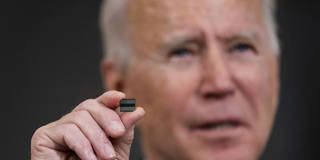OnPoint Subscriber Exclusive
The Big Picture brings together a range of PS commentaries to give readers a comprehensive understanding of topics in the news – and the deeper issues driving the news. The Big Question features concise contributor analysis and predictions on timely topics.

Thucydides’s Trade Trap
Meeting at the G20 summit in Bali, US President Joe Biden and Chinese President Xi Jinping struck a more conciliatory tone, with Biden pledging that there will be no “new cold war” with China. But even if an imminent Chinese invasion of Taiwan now seems less likely, the recent escalation of American restrictions on exports of advanced technologies to Chinese firms suggests that economic decoupling will continue.
Harvard’s Dani Rodrik warns that this is a grave mistake. With its new rules, the Biden administration is “aiming at nothing less than preventing China’s rise as a high-tech power,” thereby “doubling down on US primacy instead of accommodating the realities of a post-unipolar world.” China will view the new US restrictions as “an aggressive escalation” – rather than a “calibrated” response “clearly linked to the damage inflicted by the other side’s policies” – and “find ways to retaliate, raising tensions and further heightening mutual fears.”
Likewise, Yale’s Pinelopi Koujianou Goldberg shows that the national-security argument used to justify the new restrictions simply doesn’t add up. “Technology developed for commercial use is often used for military purposes,” she notes. So, “if national security is really the concern, the US should stop all trade with unfriendly countries, not just trade in technologically advanced products.”
More broadly, former Swedish prime minister Carl Bildt argues, the Biden administration’s decision to eschew “an assertive free-trade agenda” gives China an advantage “in precisely the area where it is ascendant.” After all, China continues to pursue an “aggressive trade agenda,” eagerly building trade and economic relationships that will “strengthen its political power,” with “obvious geopolitical ramifications down the road.”
Sergei Guriev of Sciences Po disagrees. In his view, the “friendshoring” concept that the US and its partners are increasingly embracing is “more economically sound than its critics allow.” Perhaps more important, reducing dependence on trade with autocracies is vital to enable the West to meet the threat posed by “autocrat-backed lobbyists, enablers, fellow-travelers, and ‘understanders’” who are “trying to undermine the democratic world’s unity and weaken its resolve to maintain sanctions against Russia and arms deliveries to Ukraine.”
The stakes of this debate should not be underestimated. As New York University’s Nouriel Roubini warns, “the return of protectionism and the Sino-American decoupling will leave the global economy, supply chains, and markets more balkanized and fragmented” – a trend that is “deeply stagflationary.” In fact, contrary to Biden’s recent statements, “the new Sino-American cold war is getting colder by the day” – and could “all too easily turn hot.”